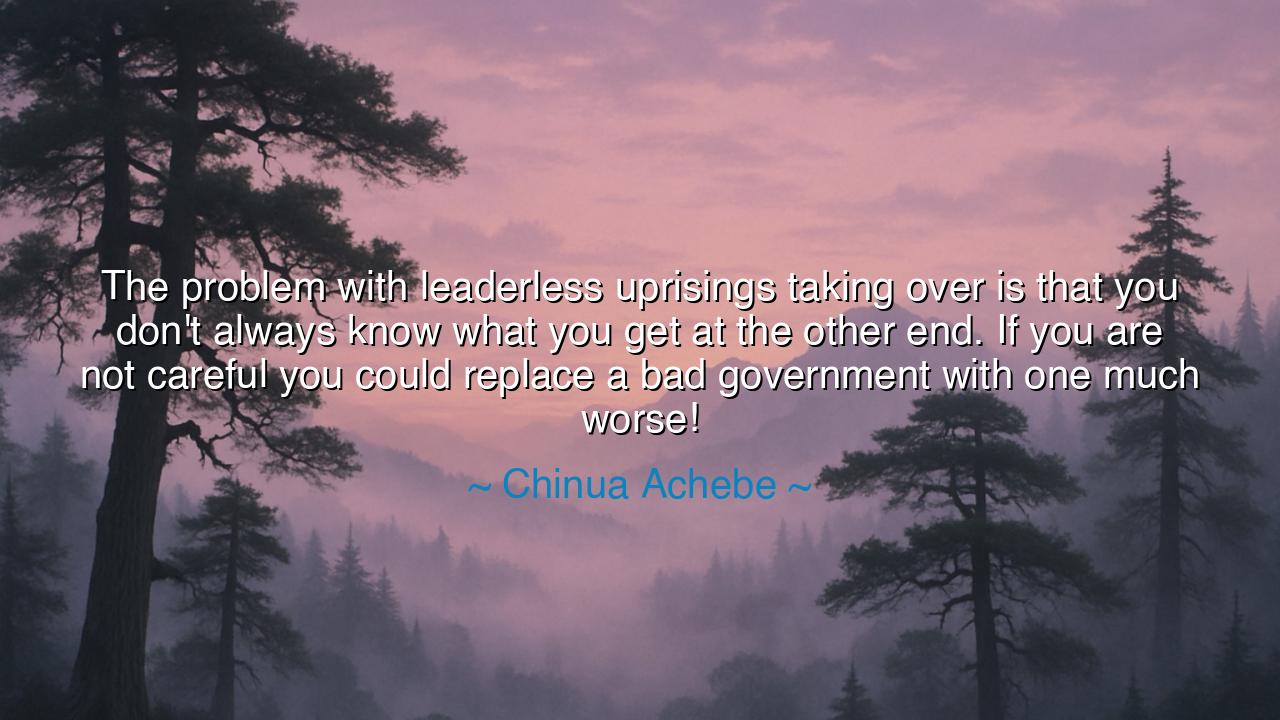
The problem with leaderless uprisings taking over is that you
The problem with leaderless uprisings taking over is that you don't always know what you get at the other end. If you are not careful you could replace a bad government with one much worse!






When Chinua Achebe declared, “The problem with leaderless uprisings taking over is that you don't always know what you get at the other end. If you are not careful you could replace a bad government with one much worse,” he spoke not only as a writer, but as a philosopher of nations. Achebe, the sage of Africa’s soul, understood the deep and tragic rhythm of history — how peoples rise against oppression with righteous fury, yet too often, in their haste, sow the seeds of new tyranny. His words are a warning carved in the language of experience: that revolt without wisdom is as dangerous as tyranny without mercy. He teaches that the fall of one regime means little if the hearts of men remain ungoverned by justice, vision, and unity.
The origin of this insight lies in Achebe’s lifetime witnessing of political turmoil across Africa, particularly in his homeland, Nigeria. Born under colonial rule, he watched his nation emerge from the shadow of empire only to be consumed by civil war, coups, and corruption. Achebe’s generation dreamed of liberation — of governments founded upon dignity and self-determination — but he lived to see those dreams twisted into chaos by power-hungry opportunists. His experiences taught him that freedom is not secured by the fall of the tyrant alone, but by the rise of moral leadership capable of sustaining it. He knew that every revolution demands more than anger; it demands character, purpose, and guidance, lest the fire that burns the oppressor also consume the people themselves.
History itself bears grim testimony to Achebe’s truth. Consider the French Revolution, that great explosion of liberty which began with cries of “Equality!” and ended with the blade of the guillotine. In their zeal to overthrow the monarchy, the people cast down one oppressor, only to empower another — the Reign of Terror under Robespierre, where justice became vengeance and freedom turned into bloodshed. What began as a moral uprising collapsed into anarchy, paving the way for Napoleon’s empire, a new despotism born from the ashes of the old. The revolutionaries had won the battle against tyranny, but lost the war for virtue. Achebe’s warning rings clearly here: when chaos triumphs over conscience, liberty becomes merely another mask for power.
And yet, his words do not counsel fear or inaction. Achebe does not say “do not rise,” but rather, “rise wisely.” Every people has the right — even the duty — to resist injustice, but revolt without direction is like a storm without horizon. It destroys, but does not build. The Arab Spring offers a modern echo of this tragedy. Across the Middle East, millions rose against dictatorship in pursuit of freedom, but without unity or leadership, their movements fractured. Some nations fell into civil war; others traded one form of tyranny for another. The cry for democracy, noble in intent, was drowned by the roar of factions and foreign interference. Achebe foresaw this danger: that without vision, revolution is but the prelude to new chains.
Achebe’s wisdom springs from a profound understanding of human nature. He knew that power, like fire, reveals the true nature of those who wield it. A people unprepared for self-governance will often repeat the mistakes of their masters, for tyranny is not only in palaces — it resides in the hearts of men. Thus, before tearing down a government, one must first build up the moral architecture of society: integrity in leadership, courage in citizens, and a culture that honors truth above tribe. Achebe believed that political reform begins not with coups or uprisings, but with character — the invisible foundation of all lasting freedom.
His warning also carries a timeless moral weight for every generation and every land. Whether in nations, institutions, or communities, the lesson endures: destruction is easy, creation is sacred. To reform the world is to shoulder the burden of wisdom — to temper passion with patience, anger with understanding, and revolution with responsibility. The wise do not merely shout against the darkness; they build the lamp. Achebe’s quote thus becomes a mirror to the soul of every society that demands change — asking not, “What will you overthrow?” but, “What will you create in its place?”
The lesson is clear and eternal: freedom without wisdom is a mirage, and rebellion without virtue leads only to ruin. To build a better future, one must not only oppose the unjust but also cultivate the just within oneself. Be the kind of leader you wish to follow. Before toppling the old order, ensure that what replaces it is guided by conscience, compassion, and truth. For as Achebe teaches, the world does not perish because of tyranny alone — it perishes because good people rise without guidance and rebuild without vision.
So let his words echo in the hearts of all who seek justice: it is not enough to tear down; one must also build up. Revolt is the birth cry of liberty, but wisdom is its guardian. The true victory of a people lies not in the fall of their oppressor, but in the rise of their moral strength — for only when the spirit of justice rules the hearts of men will governments, both old and new, bow before the will of righteousness.






AAdministratorAdministrator
Welcome, honored guests. Please leave a comment, we will respond soon